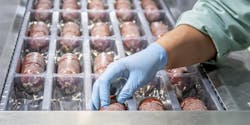JBS Reopens One Plant, Suspends Production At Another Over COVID-19 Concerns
JBS USA announced April 20 that they would cease operations at a third U.S. plant as the coronavirus continues to spread in plants deemed critical by stay-at-home orders. JBS’s Worthington, Minnesota pork production factory will cease operations after two days to finish processing existing inventory. On the same day, the US wing of the Sao Paulo-based food processing company reopened its Souderton, Pennsylvania beef processing plant. A third company plant near JBS USA’s national headquarters in Greeley, Colorado remains closed.
According to JBS USA, the plant, which employs more than 2,000 workers, will remain closed indefinitely. The workers will continue to be paid.
In a statement, President of JBS USA’s pork division Bob Krebs said the decision was not made lightly. “We have taken aggressive actions to keep coronavirus out of our plant and keep this critical infrastructure facility operational.” He expressed hope that more widespread testing for coronavirus implemented by Governor Tim Walz “will help all of us better understand the measures we must take to stop its potential spread.”
Measures implemented by JBS at active factories reportedly include taking employee temperatures as they enter the plant, providing personal protective equipment, staggering shifts, hiring dedicated cleaning staff to work “continuously,” waiving short-term disability waiting periods, and providing vulnerable employees with full pay and benefits for staying home.
The JBS USA statement also contained a note on an additional threat to ordinary production: absenteeism. “When COVID-19 is prevalent in the community, fear is heightened, absenteeism rises, and the challenge of keeping the virus out becomes greater,” the statement reads. “When absenteeism levels become too high, facilities cannot safely operate.” According to the Greeley Tribune, hundreds of workers called off work at JBS USA’s Greeley, Colorado location after several workers tested positive for the virus. According to NPR, Tyson Foods employees have also responded by staging walk-outs.
The opening and closing factories reflect the uncomfortable situation food processors in the United States are faced with. Businesses that work with grocery supply chains and food supply in general are considered “essential” by stay-at-home orders, requiring them to remain open even as nonessential businesses send workers home with paid leave to reduce the risk of virus transmission.
Last week, on April 12, Smithfield Foods closed a pork production plant in Sioux Falls, South Dakota, after the South Dakota governor and Sioux Falls mayor wrote them a letter asking them to. In that letter, the pair of officials pointed out that the Sioux Falls plant was connected to more than 50% of cases in the state.
According to Smithfield Foods, that one plant is normally responsible for almost 5% of all of the pork production in the United States. That led Smithfield CEO Kenneth Sullivan to express concern about how the virus might imperil the country’s regular food supply: Keeping grocery stores, another essential business, running and stocked is “impossible” without running food production plants, said Sullivan.
About the Author
IW Staff
Find contact information for the IndustryWeek staff: Contact IndustryWeek
